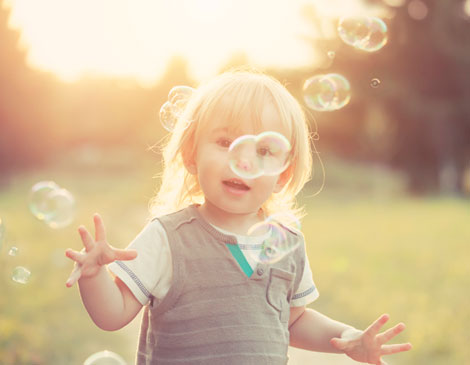She is an equal-opportunity greeter. Hello to the tail-thumping dog on the sidewalk. Hello to the porcelain dog in the antique shop window.
Hello to the tattooed girl in the froyo store, to the infant asleep on his father’s chest. Hello to ants, to bubbles, to the old woman gazing out a window and the motorcycle roaring by and the bird singing on the wire.
The first time she stood on the shore of Lake Erie, she blew it a kiss.
The baby doesn’t care if she gets a reply. She is as generous as she is indiscriminate. She bestows greetings and waves on one and all, not so much like a queen as a tiny, toddling Buddhist monk. This world itself — with a sweet surprise around every corner, with every moment, the moment — is more than enough reward.
Is it possible my mind was once that fresh and receptive? If only I could remember what it felt like. I imagine it as a brand-new notebook, begging for scribbles and doodles.
On this page, a list of fine new words: Slide. Jump. All done. Quack. Poop. On the next, feverish arrows, connecting previously random objects: cookie to cupboard, Nana to books, crib to NO. On another, a growing list of reliable ways to get attention: wailing, smiling, climbing onto the kitchen table.
Many, many clean pages ready for whatever comes next.
I wish I could recapture even a moment from that time of life. What it must have been like to first understand that those starry things waving in the air belonged to me and were useful for grabbing objects I wanted. Or to figure out that the flat red circle in my picture book represented an actual real life ball.
The discovery that we all have belly buttons — mind-blowing! The first time I saw the moon, tasted a strawberry, stood in the rain — did I think, just like Satchmo, What a wonderful world?
I can’t remember. So I turned to Jean Piaget, whose studies on how children learn were the bible back when I was a social science major.
Piaget loved kids. He loved to watch them and ask them questions and give them little puzzles to solve.
He posited a series of stages he thought children went through, and though nowadays he has his critics, much of what he found rings true to me.
Babies, he said, are born with innate little templates that they build on. They assimilate: The baby learned that the plump orange creature that lives in her house and does not want its tail pulled is a cat. They accommodate: The baby learned the word applies not just to her Iggy but also to sleek black cats and tiny striped kittens. And Piaget believed that cognitive development didn’t progress at a steady rate, but instead in dazzling leaps and bounds.
These days, my mind is so crowded with stuff there’s barely room for turning around, let alone leaping. Now and then there’s a dance party up there, but not as often as I’d like.
And here’s another thing to be wistful about: The baby I’m reveling in is our first grandchild, and everyone agrees how much she looks like her mother, our first child. Yet my memories of her mother when she was 18 months old are pitifully few. (Please don’t even ask about our next two kids.)
Thank goodness for photos. Without them I might have forgotten how she insisted on sleeping with a toy car almost as big as she was or how she’d solemnly pore over Richard Scarry’s books as if deciphering a secret code.
Back then, there was always too much else to do — cooking, laundry, cleaning — besides enjoying her. There was worrying about money. There was the relentless pull of my own work, the writing I longed to do and never had enough time for.
These weren’t distractions; they were real life. Real life means we miss things. We can’t be everywhere we want, we can’t be everything we want, not all at once.
Mothers know this much too well, but that doesn’t mean we don’t rue and regret it.
If I had a time machine, one of the first things I’d do is zip back to sit on our old braided rug and pretend to eat the plastic banana my daughter gave me.
“Thank you,” I’d exclaim, “how delicious!” Fifty-seven times, I’d do it. I’d think about nothing besides her smile and her delight.
The day the baby met Lake Erie, her mother and I both held her hands. But when the first wave lapped her toes, she pulled free of us and crouched to touch the water.
Her mother threw back her head and laughed, and for an instant I remembered how she too once went about, greeting the world.
Hello, hello! My mind leaped, and so did my heart.
The baby stood up. She blew the lake — the world — a kiss. I did too.




